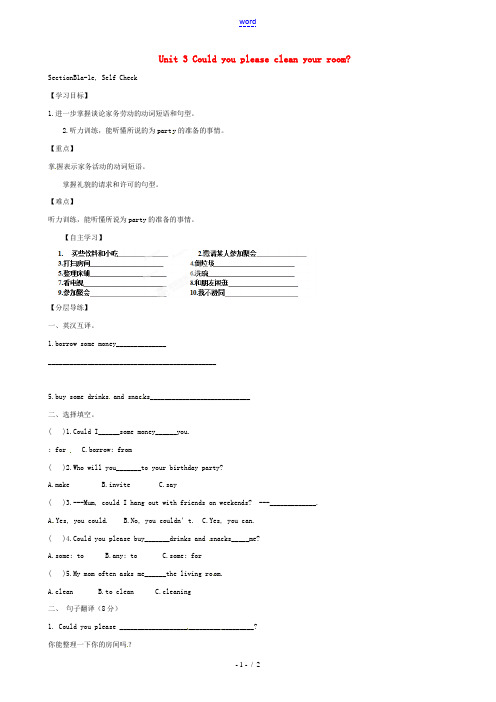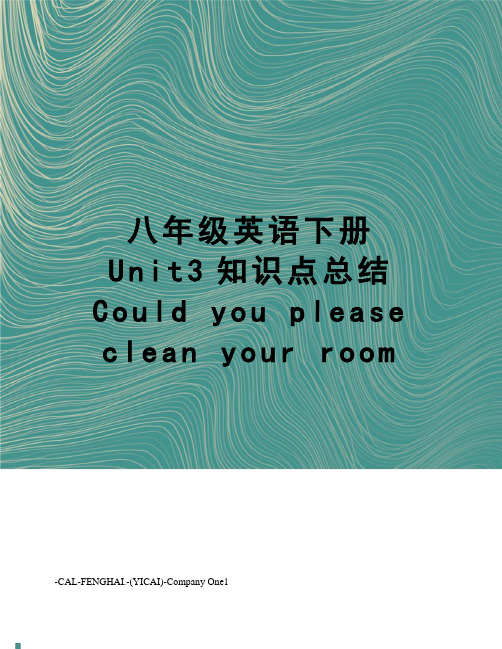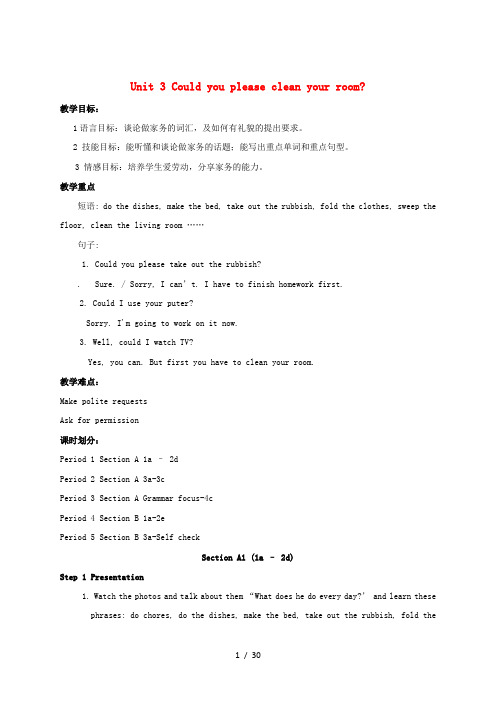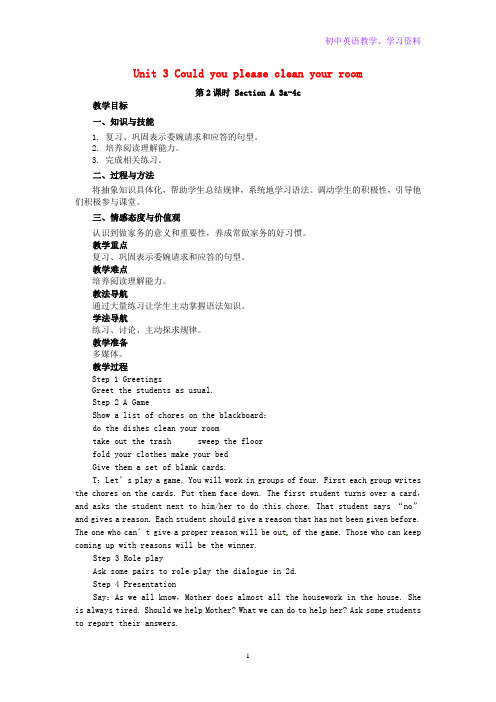重庆市大足区拾万中学八年级英语下册 Unit 3 Could you please clean
- 格式:doc
- 大小:43.50 KB
- 文档页数:3

Unit 3 Could you please clean your room? SectionB1a-1e, Self Check【学习目标】1.进一步掌握谈论家务劳动的动词短语和句型。
2.听力训练,能听懂所说的为part y的准备的事情。
【重点】掌握表示家务活动的动词短语。
掌握礼貌的请求和许可的句型。
【难点】听力训练,能听懂所说为party的准备的事情。
【自主学习】【分层导练】一、英汉互译。
1.borrow some money_____________________________________________________________5.buy some drinks and snac ks____________________________二、选择填空。
( )1.Could I______some money______you.; for C.borrow; from( )2.Who will you_______to your birthday party?A.makeB.inviteC.say( )3.---Mum, could I hang out with friends on weekends? ---_____________.A.Yes, you could.B.No, you couldn’t.C.Yes, you can.( )4.Could you please buy_______drinks and snacks_____me?A.some; toB.any; toC.some; for( )5.My mom often asks me______the living ro om.A.cleanB.to cleanC.cleaning二、句子翻译(8分)1. Could you please _____________________________________?你能整理一下你的房间吗?2. I ________________ do some work.我必须干些活。

八年级英语下册U n i t3知识点总结C o u l d y o u p l e a s ec l e a n y o u r r o o m -CAL-FENGHAI.-(YICAI)-Company One1Unit3 Could you please clean your roomPeter ,could you please take out the trash 彼得,你能把垃圾倒了吗Could you please do sth 请你(做)......好吗用于提出请求,希望得到对方的肯定回答,说话的语气比较客气委婉。
Could 不是can的过去式,是委婉、礼貌的说法。
回答用can.【常用答语】肯定回答:Sure./ Of course./ Certainly./No problem. 否定回答:Sorry , I can’t 2、take out 取出(v+ adv)【注】: 跟代词做宾语,代词放中间;跟名词做宾语,可放在中间,也可放在后边His teeth hurt badly. The dentist take them out .【短语】take out the trash 倒垃圾 take a walk 散步 take away 拿走,取走take back 收回 take place 发生 take off 脱下;起飞3. Can you do the dishes.那你可以洗盘子吗do the dishes 洗碗【结构1】do the +名词: do the dishes/ laundry 洗餐具/衣服【结构2】do the +动词-ing do the cleaning 打扫卫生【结构3】do one’s + 名词do one’s housework/ homework 做家务/家庭作业【结构4】do some +动词-ing do some reading/ shopping 读写书/购物Could I at least finish watching this show 至少让我看完这个节目可以吗1】Could I do a sth 我可以做......吗用于表达请求,语气比较委婉。

Unit 3 Could you please clean your room?教学目标:1语言目标:谈论做家务的词汇,及如何有礼貌的提出要求。
2 技能目标:能听懂和谈论做家务的话题;能写出重点单词和重点句型。
3 情感目标:培养学生爱劳动,分享家务的能力。
教学重点短语: do the dishes, make the bed, take out the rubbish, fold the clothes, sweep the floor, clean the living room ……句子:1. Could you please take out the rubbish?. Sure. / Sorry, I can’t. I have to finish homework first.2. Could I use your puter?Sorry. I'm going to work on it now.3. Well, could I watch TV?Yes, you can. But first you have to clean your room.教学难点:Make polite requestsAsk for permission课时划分:Period 1 Section A 1a – 2dPeriod 2 Section A 3a-3cPeriod 3 Section A Grammar focus-4cPeriod 4 Section B 1a-2ePeriod 5 Section B 3a-Self checkSection A1 (1a – 2d)Step 1 Presentation1. Watch the photos a nd talk about them “What does he do every day?’ and learn thesephrases: do chores, do the dishes, make the bed, take out the rubbish, fold theclothes, do the laundry, clean the living room.2. Play a game. You do and I say. Work with your partner, and guess what he/she does.3. Look these phrases and practice the conversation: Could you please take out therubbish? Sure. / Sorry, I can’t. I have to finish homework first.4. 1a Do you do these chores at home? Discuss them with your partner.Step 2 Listening1b Listen. Who will do these chores? Check (√) Peter’s mother or Peter.Step 3 Practice1c Make conversations about the chores in 1a.Make conversations.ExamplesA: Could you please...?B: Yes, sure. /All right. /No problem./Certainly.Sorry, I can't. I have to do...Sorry, I can't. I am doing...Step 4 Listening 2a&2bPeter asks his father if he can do four things. What does his father say? Check (√) “yes” or “no”. Listen again. Draw lines to the reasons.Listen to the tape again and underline how Peter asks permission and request and pay attention to his father’s replies.Peter: Hey, Dad?Dad: Yes?Peter: Could I go out for dinner with my friends tonight?Dad: Sure, that should be OK.Peter: Could I go to the movies after that? My friends said the new action movie is really good.Dad: I guess so. But don’t stay out late.Peter: Could I stay out until eleven? We might get something to drink after the movie. Dad: No, you can’t. You have a basketball game tomorrow, remember? You need a good rest. Peter: Oh, yeah. Well, could you give me a ride to town now? If I take the bus, I’ll be late.Dad: I can’t, Peter. I have to do some work now.Peter: Oh, OK. I’ll call Alan. Maybe his dad can give me a ride.Step 5 PracticeAsk for permission礼貌地取得同意2c Make conversations using the information in 2a and 2bA: Could I use your puter?B: Sorry. I’m going to work on it now.A: Well, could I watch TV?B: Yes, you can. But first you have to clean your room?2d Role –play the conversationStep 6 Language points1. Tony, could you please help out with a few things?help out 动词短语,表示在某人繁忙或遇到困难时“给予帮助”。


Unit 3 Could you please clean your room第2课时 Section A 3a-4c教学目标一、知识与技能1. 复习、巩固表示委婉请求和应答的句型。
2. 培养阅读理解能力。
3. 完成相关练习。
二、过程与方法将抽象知识具体化,帮助学生总结规律,系统地学习语法。
调动学生的积极性,引导他们积极参与课堂。
三、情感态度与价值观认识到做家务的意义和重要性,养成常做家务的好习惯。
教学重点复习、巩固表示委婉请求和应答的句型。
教学难点培养阅读理解能力。
教法导航通过大量练习让学生主动掌握语法知识。
学法导航练习、讨论、主动探求规律。
教学准备多媒体。
教学过程Step 1 GreetingsGreet the students as usual.Step 2 A GameShow a list of chores on the blackboard:do the dishes clean your roomtake out the trash sweep the floorfold your clothes make your bedGive them a set of blank cards.T:Let’s play a game. You will work in groups of four. First each group writes the chores on the cards. Put them face down. The first student turns over a card,and asks the student next to him/her to do this chore. That st udent says “no” and gives a reason. Each student should give a reason that has not been given before. The one who can’t give a proper reason will be out of the game. Those who can keep coming up with reasons will be the winner.Step 3 Role playAsk some pairs to role play the dialogue in 2d.Step 4 PresentationSay:As we all know,Mother does almost all the housework in the house. She is always tired. Should we help Mother? What we can do to help her? Ask some students to report their answers.Say:Now let’s read an article about Nancy and her mother. Please read quickly and answer the questions:1. Why was Nancy’s mom angry with her? 2. Did they solve the problem? How?Then ask some students to report their answers.Now let’s read the sentences in 3b,try to understand and translate them. Then read the passage again carefully and try to underline the sentences from the reading that mean the same thing. After several minutes, ask some students to repor t their answers and translate the sentences into Chinese.Step 6 Language points1. You watch TV all the time and ...all the time(在该段时间内)一直;向来,一向;时时刻刻;每时每刻e.g. I do this all the time. 我一直是这么做的。

Unit 3《Could you please clean your room》一、教材分析本单元的主要语言功能是礼貌地请求别人做某事和向他人请求允许做某事,语法项目是Could you please do…?和Could I do …?从教材的整合来说它是Can you do…?(表请求)和Can I do …?(请求许可)的延续,只是表达更委婉,更有礼貌。
从本单元来说,它既是本单元的基本语言内容,又为本单元知识扩展和综合语言运用奠定坚实的基础。
本单元话题又贴近他们的生活,应该会有话可讲,有话要讲。
二、重、难点知识点提示重点:让学生掌握词汇的运用以及用Could you please do…? Could I do…?两个句型提出请求和请求许可。
难点:本节课表示家务的动词词组较多,较难记忆和运用。
三、重点知识点讲解:考点(一)词语辨析Ⅰ. either/neither /none/ all/ both的用法。
either:1.否定句中的“也”。
如 A:I don't like music.B: Me either.(A说:我不喜欢音乐。
B说:我也是)2.两者其中之一。
如:A:Which would you like to drink,water or tea? B:Either of them is ok.(A说:你喜欢喝水还是茶?B:说哪种都行。
)neither:两者都不。
如:Neither of my parents has been to Baijing.(我父母两人都没去过北京)。
特殊句式:neither…nor… Neither you nor me am a doctor.(不论你还是我都不是医生)此结构中be的形式根据临近它的主语而定,即就近原则。
表达“……也不……” 则用“Neither /Nor + be / V助 / V情 + 主”—The first one wasn’t bad. — Neither was the second.both:两者都。
Could you please clean your roomUnit 3 Could you please clean the room? Period 4 Content Section B 1a, 1b, 1c, 1d, 1e教学目标要求1.能使用情态动词could礼貌地提出请求并作答,如:— Could you clean your room? — Yes, I can.2.能使用情态动词could向别人请求许可并作答,如:— Could I invite my friends to a party? — No, you can’t have a party. You have a test on Monday.3.能运用Could you…? 和Could I…? 来谈论日常活动,在新的语言环境中进一步运用目标语言,如:Could I use your CD player? Yes, if you are careful with it.4.能灵活运用和表达有关日常活动的词组,如:buy some drinks and snacks, borrow some money, invite my friends to a party, use your CD player 等。
5.能认读并能工整书写所学单词:snack等。
6.能模仿录音正确朗读,分角色对目标语进行进一步的表达,如:— Could I invite my friends to a par ty? — No, you can’t have a party. You have a test on Monday.教学过程活动步骤教与学活动目的及其操作教学资源运用复习时间4 m 1复习已学家务活的短语和导入谈论日常活动的话题。
Show some pictures about chores and ask students: What is the girl’s mother a sking her to do? (take out the rubbish, buy some drinks and snacks, and so on)T: What chores do your parents usually ask you to do at home? Let’s talk about the chores you do.2仿照上述对话,组织Pair work复习活动。
Unit 3 Could you please clean your room Section B 1(1a-2e)Step 1 Revision单项选择。
1. -- Could you please take care of my dog?-- ______. I’m too busy.A. Yes, you canB. SureC. Sorry, I can’t2. -- Could you please ____ his bed?-- Certainly!A. makesB. makingC. make3. -- Could I use your car?-- ______.A. Sure, you canB. Sorry, you canC. Sure, I can4. Could you help _____?A. making the bedB. make the bedC. made the bedStep 2 DiscussionQ1: Do you help your parents do the chores at home?Q2: Do you ask your parents’ permission for?Q3: Do your parents ask you to do some things for them?Give some pictures and answer the following questions.What do your parents ask you to do?What do you ask your parents’ permission for?Step 3Finish 1a. What do teenagers ask their parents’permission for? What do parents ask their teenagers to do? Write parents or teenagers next to eachphrase.1. buy some drinks and snacks2. borrow some money3. clean your room4. invite my friends to a party5. go to the store6. use your CD player7. take out the rubbish8. make your bedStep 4Finish 1b. Use the phrases in 1a to make conversations.Step 5 Pair work1. Parents: Could you please…?Child: Yes, sure. / Sorry, I can’t. I have to ...2. Child: Could I …?Parents: Yes, you can. / No, you can’t. You ...Step 6 ListeningFinish 1c. Listen to a conversation between Sandy and her mom. Check (√ ) the things in 1a that you hear.1. buy some drinks and snacks2. borrow some money3. clean your room4. invite my friends to a party5. go to the store6. use your CD player7. take out the rubbish8. make your bedFinish 1d. Listen again. Fill in the chart.Step 7 Finish 1e.You are having a party. Invite your partner to come your party and ask for help withthese things. So, talk about the following things with your partner.e.g.A: Would like to come to my birthday party?B: Yes, I’d love to./Sorry, I can’t. I have to…A: Could you please take out the rubbish?B: Yes, sure./No, I can’t. I have to do…Step 8 Reading1. Warming up2a. Discuss the questions with your partner1) What do you often do to help your parents at home?2) Do you think kids should help out with chores at home?2. New wordsstress n. 精神压力; 心理负担waste n.浪费; 垃圾 v. 浪费; 滥用depend v. 依靠; 依赖develop v. 发展; 壮大fairness n.公正性; 合理性since conj. 因为; 既然prep., conj. & adv. 从……以后; 自……以来neighbor(= neighbour) n. 邻居drop v. 落下; 掉下3. Skimming2b. The Sunday Mail magazine invited parents to write about whether they think young people should do chores at home. Skim the following letters. Which one agrees an d which one disagrees?了解阅读策略:Skimming 意为“快速掠过,从中提取最容易取得的精华”。
Unit 3 Could you please clean your room Section A 1(1a-2d)学习目标:1语言目标:谈论做家务的词汇,及如何有礼貌的提出要求。
2 技能目标:能听懂和谈论做家务的话题;能写出重点单词和重点句型。
3 情感目标:培养学生爱劳动,分享家务的能力。
学习重点短语: do the dishes, make the bed, take out the rubbish, fold the clothes, sweep the floor, clean th e living room ……句子:1. Could you please take out the rubbish?. Sure. / Sorry, I can’t. I have to finish homework first.2. Could I use your computer?Sorry. I'm going to work on it now.3. Well, could I watch TV?Yes, you can. But first you have to clean your room.学习难点:Make polite requestsAsk for permission课时划分:Period 1 Section A 1a – 2dPeriod 2 Section A 3a-3cPeriod 3 Section A Grammar focus-4cPeriod 4 Section B 1a-2ePeriod 5 Section B 3a-Self checkSection A1 (1a – 2d)Step 1 Warming-upSing the song and dance to the musicStep 2 Presentation1. W atch the photos and talk about them “W hat does he do every day?’ and learnthese phrases: do chores, do the dishes, make the be d, take out the rubbish, fold the clothes, do the laundry, clean the living room.2. Look these phrases and practice the conversation: Could you please takeout the rubbish? Sure. / Sorry, I can’t. I have to finish homework first.3. 1a Do you do these chores at home? Discuss them with your partner.Step 3 Listening1b Listen. Who will do these chores? Check (√) Peter’s mother or Peter. Chores Peter’s mother Peterdo the dishessweep the floortake out the rubbishmake the bedfold the clothesclean the living roomStep 4 Practice1c Make conversations about the chores in 1a.Make conversations.ExamplesA: Could you please...?B: Yes, sure. /All right. /No problem./Certainly.Sorry, I can't. I have to do...Sorry, I can't. I am doing...Step 5 Listening 2a&2bPeter asks his father if he can do four things. What does his father say? Check (√) “yes” or “n o”. Listen again. Draw lines to the reasons.His father’s reasonsPeter wants to…Peter’s fathersays…go out for dinner. Yes No I have to do some work.go to the movies. Yes No You have to clean your roomstay out late. Yes No I need to eat breakfast.get a ride. Yes No You have a basketball game.Step 6 Practice2c Make conversations using the information in 2a and 2bA: Could I use your computer?B: Sorry. I’m goin g to work on it now.A: Well, could I watch TV?B: Yes, you can. But first you have to clean your room?2d Role –play the conversationStep 7 Language points and summary1. Tony, could you please help out with a few things?help out 动词短语,表示在某人繁忙或遇到困难时“给予帮助”。
Unit 3 Could you please clean your room Section A 1(1a-2d)
学习目标:
1语言目标:谈论做家务的词汇,及如何有礼貌的提出要求。
2 技能目标:能听懂和谈论做家务的话题;能写出重点单词和重点句型。
3 情感目标:培养学生爱劳动,分享家务的能力。
学习重点
短语: do the dishes, make the bed, take out the rubbish, fold the clothes, sweep the floor, clean the living room ……
句子:
1. Could you please take out the rubbish?
. Sure. / Sorry, I can’t. I have to finish homework first.
2. Could I use your computer?
Sorry. I'm going to work on it now.
3. Well, could I watch TV?
Yes, you can. But first you have to clean your room.
学习难点:
Make polite requests
Ask for permission
课时划分:
Period 1 Section A 1a – 2d
Period 2 Section A 3a-3c
Period 3 Section A Grammar focus-4c
Period 4 Section B 1a-2e
Period 5 Section B 3a-Self check
Section A1 (1a – 2d)
Step 1 Warming-up
Sing the song and dance to the music
Step 2 Presentation
1. W atch the photos and talk about them “W hat does he do every day?’ and learn
these phrases: do chores, do the dishes, make the bed, take out the rubbish, fold the clothes, do the laundry, clean the living room.
2. Look these phrases and practice the conversation: Could you please take
out the rubbish? Sure. / Sorry, I can’t. I have to finish homework first.
3. 1a Do you do these chores at home? Discuss them with your partner.
Step 3 Listening
1b Listen. Who will do these chores? Check (√) Peter’s mother or Peter.
Step 4 Practice
1c Make conversations about the chores in 1a.
Make conversations.
Examples
A: Could you please...?
B: Yes, sure. /All right. /No problem./Certainly.
Sorry, I can't. I have to do...
Sorry, I can't. I am doing...
Step 5 Listening 2a&2b
Peter asks his father if he can do four things. What does his father say? Check (√) “yes” or “no”. Listen again. Draw lines to the reasons.
Step 6 Practice
2c Make conversations using the information in 2a and 2b
A: Could I use your computer?
B: Sorry. I’m going to work on it now.
A: Well, could I watch TV?
B: Yes, you can. But first you have to clean your room?
2d Role –play the conversation
Step 7 Language points and summary
1. Tony, could you please help out with a few things?
help out 动词短语,表示在某人繁忙或遇到困难时“给予帮助”。
help和out之间还可以加入具体的“人”。
e.g. He helped me out with my task.
他帮我完成了任务。
They helped (us) out with the clean-up.
他们帮助我们做大扫除。
2. Could I at least finish watching this show?
at least 至少
e.g. We should brush our teeth at least twice a day.
我们每天应该至少刷两次牙。
3. Yes, because Mom will be back from shopping any minute now.
be back 回来
e.g. I won't be back till 11:00.
我11点以前回不来。
any minute now
一种常见的口语表达法,相当于“随时;马上;在任何时刻”的意思,表示事情有可能在极短的时间内发生或眼下就要发生。
minute还可以用second, moment, time等词替换。
e.g. Don't worry, he will come here any minute now.
别担心, 他会马上来这儿。
The guests are arriving any time now but we’re still not ready.
客人即刻就到,但我们还没有准备好。
We’re expecting them any moment now.
我们期待他们随时到来。
Step 8 Summary
1. New words and expressions
do the dishes, sweep the floor, take out the trash, make the bed, fold the clothes, clean the room
2. ---Could you please…?
---Yes, please. / Sorry, I can’t.
Step 8 Homework
1 List all the main phrases of doing chores that you know. (必做)
2 Make a conversation between you and your mother, using the sentence pattern “Could you please …?” (选做)。